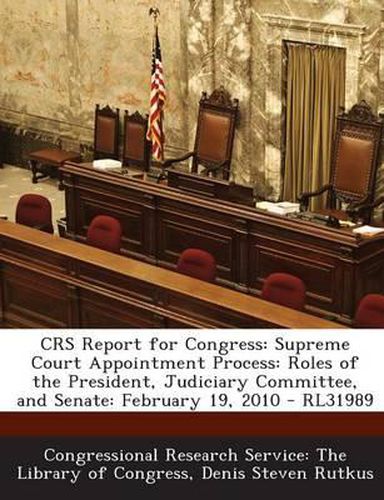Readings Newsletter
Become a Readings Member to make your shopping experience even easier.
Sign in or sign up for free!
You’re not far away from qualifying for FREE standard shipping within Australia
You’ve qualified for FREE standard shipping within Australia
The cart is loading…






The appointment of a Supreme Court Justice is an event of major significance in American politics. Each appointment is of consequence because of the enormous judicial power the Supreme Court exercises as the highest appellate court in the federal judiciary. Appointments are usually infrequent, as a vacancy on the nine-member Court may occur only once or twice, or never at all, during a particular President’s years in office. Under the Constitution, Justices on the Supreme Court receive lifetime appointments. Such job security in the government has been conferred solely on judges and, by constitutional design, helps insure the Court’s independence from the President and Congress. The procedure for appointing a Justice is provided for by the Constitution in only a few words. The “Appointments Clause” (Article II, Section 2, clause 2) states that the President “shall nominate, and by and with the Advice and Consent of the Senate, shall appoint … Judges of the supreme Court.” The process of appointing Justices has undergone changes over two centuries, but its most basic feature–the sharing of power between the President and Senate–has remained unchanged: To receive lifetime appointment to the Court, a candidate must first be nominated by the President and then …
$9.00 standard shipping within Australia
FREE standard shipping within Australia for orders over $100.00
Express & International shipping calculated at checkout
The appointment of a Supreme Court Justice is an event of major significance in American politics. Each appointment is of consequence because of the enormous judicial power the Supreme Court exercises as the highest appellate court in the federal judiciary. Appointments are usually infrequent, as a vacancy on the nine-member Court may occur only once or twice, or never at all, during a particular President’s years in office. Under the Constitution, Justices on the Supreme Court receive lifetime appointments. Such job security in the government has been conferred solely on judges and, by constitutional design, helps insure the Court’s independence from the President and Congress. The procedure for appointing a Justice is provided for by the Constitution in only a few words. The “Appointments Clause” (Article II, Section 2, clause 2) states that the President “shall nominate, and by and with the Advice and Consent of the Senate, shall appoint … Judges of the supreme Court.” The process of appointing Justices has undergone changes over two centuries, but its most basic feature–the sharing of power between the President and Senate–has remained unchanged: To receive lifetime appointment to the Court, a candidate must first be nominated by the President and then …